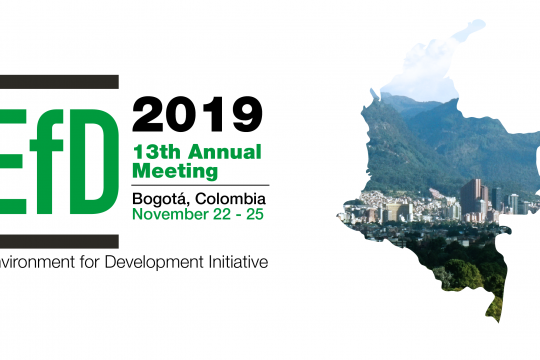Yes, there will be magic in the air at the EfD Annual Meeting. The EfD Director Gunnar Köhlin explains why he and others are looking forward to it so much and what will be on the agenda at the biggest environmental economics conference in the Global South that starts on Friday, November 22 in Bogota.
The EfD magic. That’s what I’m looking forward to. Something special happens when the EfD researchers all come together once a year to share ideas. It’s like Christmas! Everyone is very generous with his and her time and knowledge. That’s the EfD spirit. It is like a big family, says Gunnar Köhlin, Director of EfD.
Gunnar Köhlin points to the many functions of the EfD Annual Meeting. Not only does it have inspiring keynotes and the possibility to present your own research in parallel sessions, as in most academic conferences. New proposals for EfD funding are presented and there are also a number of other meetings, both for collaborative research programs and for capacity building efforts. All of this ties the network closer.
We have to change our economies and EfD has an important part to play in promoting an inclusive green transformation in the Global South. During the Annual Meeting the EfD Board and Coordination Committee will have several meetings to discuss the next five year strategy for EfD and how EfD will contribute to meeting the big challenges in the world, says Gunnar Köhlin.
The main research topics to be discussed at this Annual Meeting include carbon pricing, energy transition, ecosystem services, forest management and gender issues.
A special treat is the tradition of policy keynotes. This year’s policy keynotes include Kevin Urama, Senior Director of the African Development Bank who will give insights from Africa about strengthening the capacity for inclusive development. Sverker Carlson Jagers, professor at the department of Political Science of Gothenburg University will speak about what affects the public’s acceptance of CO2-taxes and Suzi Kerr, Chief Economist at the Environmental Defense Fund, who will talk about carbon mitigation options for countries in the Global South.
After the Annual Meeting there will also be a special workshop about carbon pricing with top-level researchers and policy makers, to discuss how to overcome the hurdles of implementing carbon taxes in developing countries. Carbon pricing is a big area of focus, because it is pointed out as one of the best solutions for mitigating climate change, but still the use is very limited.
Carbon pricing does indeed work well if it actually is implemented but that has turned out to be very difficult. There is a lot of resistance and so much research is needed. The major issue now is how to overcome the hindrances and the skepticism about carbon taxes and higher fuel taxes.
-In some places it has been implemented in a clumsy way. So, we need to better understand how to overcome such obstacles? And how to implement it in rich or low income countries? More research has to be done on these subjects, says Thomas Sterner, professor at University of Gothenburg.
This is what the world needs today, says Thomas Sterner.
